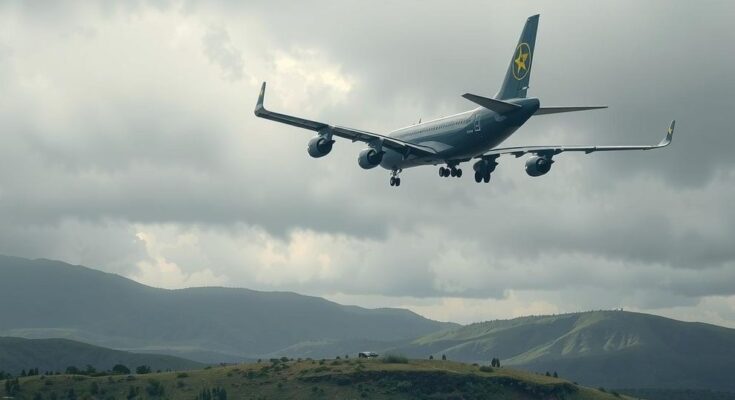President Trump deported 238 Venezuelan gang members, provoking mixed political reactions. Concurrently, Pope Francis was hospitalized, and astronauts aboard the ISS were finally relieved. A nightclub fire in North Macedonia caused 59 fatalities, while Serbia witnessed anti-government protests. The U.S. endured severe storms, and the trade war escalated with proposed tariffs on European wine. Cultural events in Val d’Isère showcased community resilience amidst these global challenges.
On March 18, 2025, President Donald Trump made headlines by deporting 238 members of a Venezuelan gang back to El Salvador. This decision is part of his ongoing narrative regarding immigration and crime, eliciting mixed reactions across political spectrums. The deportation raises significant discussions about immigration policy and its implications for international relations, particularly with Central America.
Simultaneously, concern arose on March 16 when Pope Francis was hospitalized at the Agostino Gemelli polyclinic in Rome. His supporters gathered outside, praying for his swift recovery, highlighting the intersection of faith and public life, as citizens voiced their dedication to the Catholic leader’s health.
In a technological advancement, astronauts aboard the International Space Station (ISS) received relief on March 16 as the SpaceX capsule successfully docked after nine months in orbit. This mission not only marked a triumph for the SpaceX team but also renewed discussions regarding human exploration beyond Earth.
Tragedy struck the same day, with a nightclub fire in Kočani, North Macedonia, claiming 59 lives. This incident raised critical concerns about safety regulations and emergency response protocols, urging local authorities to reassess current policies to prevent future disasters.
Amid these events, Serbia witnessed an anti-government rally on March 15, where thousands protested against corruption and demanded regulatory reforms. This unrest mirrors broader regional frustrations with governmental transparency and accountability, reflecting the public’s growing discontent.
Severe storms impacted the United States on March 15, resulting in at least 32 fatalities. Emergency services faced immense pressure as they worked to support the affected communities, prompting questions about the adequacy of resources allocated for disaster preparedness.
President Trump also threatened on March 13 to impose a 200% tariff on European wine, escalating trade concerns within the European business community. This move aligns with a broader trade strategy that has created tensions between the U.S. and its European allies.
Cuba experienced ongoing infrastructure issues, marked by yet another power outage on March 14. This blackout underscores significant challenges within the island nation’s energy sector, as citizens await effective management solutions.
International conflicts persisted, as Russia announced on March 13 the alleged recapture of Soudja, with President Vladimir Putin stating he would spare the lives of Kyiv’s soldiers. This proclamation reflects the complicated nature of ongoing military engagements and ethics surrounding wartime actions.
On the humanitarian front, Hamas fighters were deployed to Rafah on February 22, expected to facilitate the planned release of Israeli hostages. This occurrence is intricately linked to the enduring conflict and the pressing need for diplomatic interventions alongside security enhancements.
In international recognition, New Zealand soldier Dominic Abelen was honored on November 15, 2024, with a haka for his bravery during operations in Ukraine. Such acknowledgments serve as vital reminders of the sacrifices made by military personnel globally.
Shifting to cultural engagements, Val d’Isère launched the week of ‘Printemps des Poètes,’ featuring various artistic workshops and a lively postcard event at the Médiathèque. Such initiatives promote creativity and community involvement, emphasizing culture’s importance.
On this day, temperatures in Val d’Isère hovered around -2 degrees Celsius, as the mayor unveiled plans for renovating Val Village at an estimated cost of 2.6 million euros. This project aims to enhance local infrastructure while minimizing disruption for summer businesses.
A third workshop was conducted to address food accessibility, where participants worked on creating practical guides and mobile apps to assist seasonal workers while reducing waste. This community-driven focus on sustainability showcases promise for future programs.
For entertainment, the local cinema offered screenings at 17h30 and 20h30, presenting cultural options to residents. Local facilities such as the Médiathèque and Aquasportif Center maintained operating hours to promote community accessibility.
Transportation services remained functional, with trains and buses running to facilitate movement during the chilly season. Public transit options ensure convenience for individuals venturing out, fostering connections among the community.
In conclusion, the juxtaposition of global issues and local cultural expressions illustrates the interconnectedness of society. Whether grappling with serious global affairs or engaging in local art, it is evident that diverse threads of culture and experience bind us together.
This article highlights significant recent events that shape global and local dynamics, from President Trump’s deportation strategy to cultural initiatives in Val d’Isère. As nations grapple with political unrest, natural disasters, and humanitarian challenges, the community’s resilience shines through cultural engagements. The necessity for effective policies and sustainable practices becomes apparent, fostering ongoing conversations about global interconnectivity and social accountability.
Original Source: evrimagaci.org




